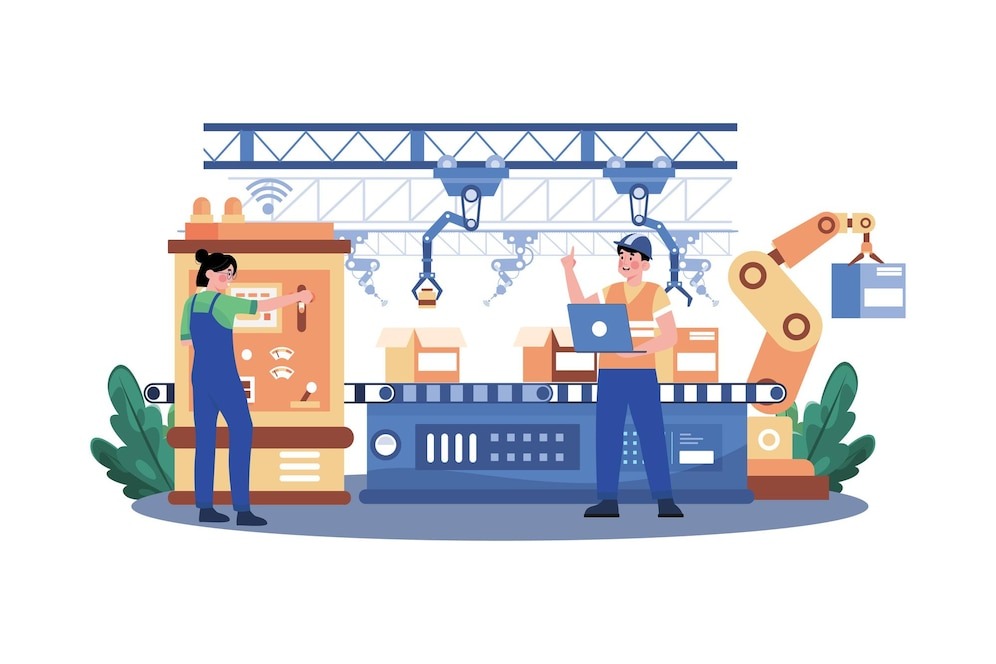Manufacturing is all about perfection and speed. Digital twins are turning the game by furnishing enterprises a real-time, virtual dupe of their operations to improve processes, reduce downtime, and boost productivity.
Also, given the changing geography of .NET, creating digital binary operations has become more possible or effective.
This blog will show you how to produce digital binary results using .NET that enable manufacturers to run more efficiently, cut waste, and enhance general performance, all while keeping costs and scalability.
What Is a Digital Twin in Manufacturing?
Whether it be a single machine, an entire plant bottom, or indeed a force chain, a digital twin is a virtual representation of a physical system.
Real-time information from detectors, outfits, and control systems is collected and input into a software model. This gives masterminds and drivers
- Cover current conditions
- Prognosticate failures
- Run simulations
- Optimize processes
For manufacturing, this means smarter opinions and fewer expensive surprises.
Why Use .NET for Digital Twin Applications?
When erecting scalable, high-performance digital binary systems, .NET offers a solid foundation.
- Cross-platform compatibility (.NET Core runs on Windows, Linux, and all platforms)
- High-performance APIs for real-time data processing
- Strong support for IoT, machine literacy, and pall integration
- Backed by Microsoft and extensively supported by enterprise systems
Partnering with a .NET software development company gives manufacturers the capability to make robust digital binary operations that integrate directly with artificial systems and evolve.
Core Components of a Digital Twin System Erected with .NET
To produce a functional digital binary operation in .NET, you generally bring together many core layers.
1. Data Acquisition Layer
This section is where detector and device data enter the system. You can use
- Azure IoT Hub or MQTT for real-time telemetry
- .NET background services to ingest and cushion data
- SignalR for live data streaming in dashboards
This subcaste needs to be presto, dependable, and secure — especially when you’re working with artificial outfits.
2. Processing and Analysis
That’s where data is reused and interpreted. In .NET, this may include
- Data parsing and metamorphosis with background workers
- Applying business sense or rules to machines
- Integrating with AI/ML models for predictive analytics
For illustration, a digital twin might dissect motor vibration data and spark an alert if thresholds suggest an impending failure.
3. Visualization and Control
The UI subcaste is how masterminds and drivers interact with the system.
You can use
- Blazor or ASP.NET Core to produce responsive dashboards
- 3D modelling tools integrated via JavaScript libraries or Unity (connected via APIs)
- Real-time announcements and controls using SignalR and gRPC
This order is where .NET shines in bringing together high-performance backend sense with an ultramodern, interactive frontend, making it a favored framework for numerous .NET development companies delivering artificial results.
Benefits of Using Digital Twins in Manufacturing
Digital twins aren’t just a buzzword — they deliver real value to manufacturing operations, especially when developed using scalable tools like .NET.
🔹 Prophetic conservation
By continuously covering asset performance, digital twins help prognosticate failures before they happen. This reduces time-out, form costs, and product losses.
🔹 Process Optimization
With real-time and literal data, masterminds can pretend different process scripts and make informed opinions, from conforming machine processes to changing material operations.
🔹 Quality Control
Digital halves can track and dissect quality criteria across the product line, catching blights beforehand and perfecting thickness.
🔹 Training and Simulation
Virtual clones of plant surroundings allow new staff to train safely and effectively without interfering with real product lines.
How .NET Supports Scalability and Cloud Integration
As digital binary systems grow, scalability becomes essential. That’s how NET helps.
- Microservice Architecture Figures: independent services for ingestion, analytics, alerts, and UI all communicating via APIs.
- Azure Integration Influence: Azure Digital Twins, IoT Hub, Functions, and Data Explorer directly with .NET services.
- Docker & Kubernetes: Containerize your operation for harmonious deployments and easier scaling.
A dedicated .NET developer can design your system to start small and grow organically with no major overhauls.
Choosing the Right Development Approach
Whether you are erecting from scratch or using heritage systems, you have options.
- In-house brigades are suitable for long-term, R&D-heavy systems.
- Hiring devoted .NET inventors offers inflexibility and specialized depth without expanding internal headcount.
- Partnering with a .NET Core development company is ideal if you want a full-service approach, from architecture to deployment and maintenance.
The key is choosing a platoon with real experience in both NET development and manufacturing systems, not just one or the other.
Final studies
Digital halves are changing the artificial sector; .NET is a logical choice for creating these results.
You may give apps that cut charges, avoid time-outs, and always enhance operations by integrating real-time data input, scalable processing, and simple user interfaces.
Whether you’re leading an invention for a big manufacturer or creating a new platform with a .NET development establishment, now is the moment to probe how digital binary technology could round out your plan.
Construct more intelligently. Grow more snappily. .NET will help you run better.
